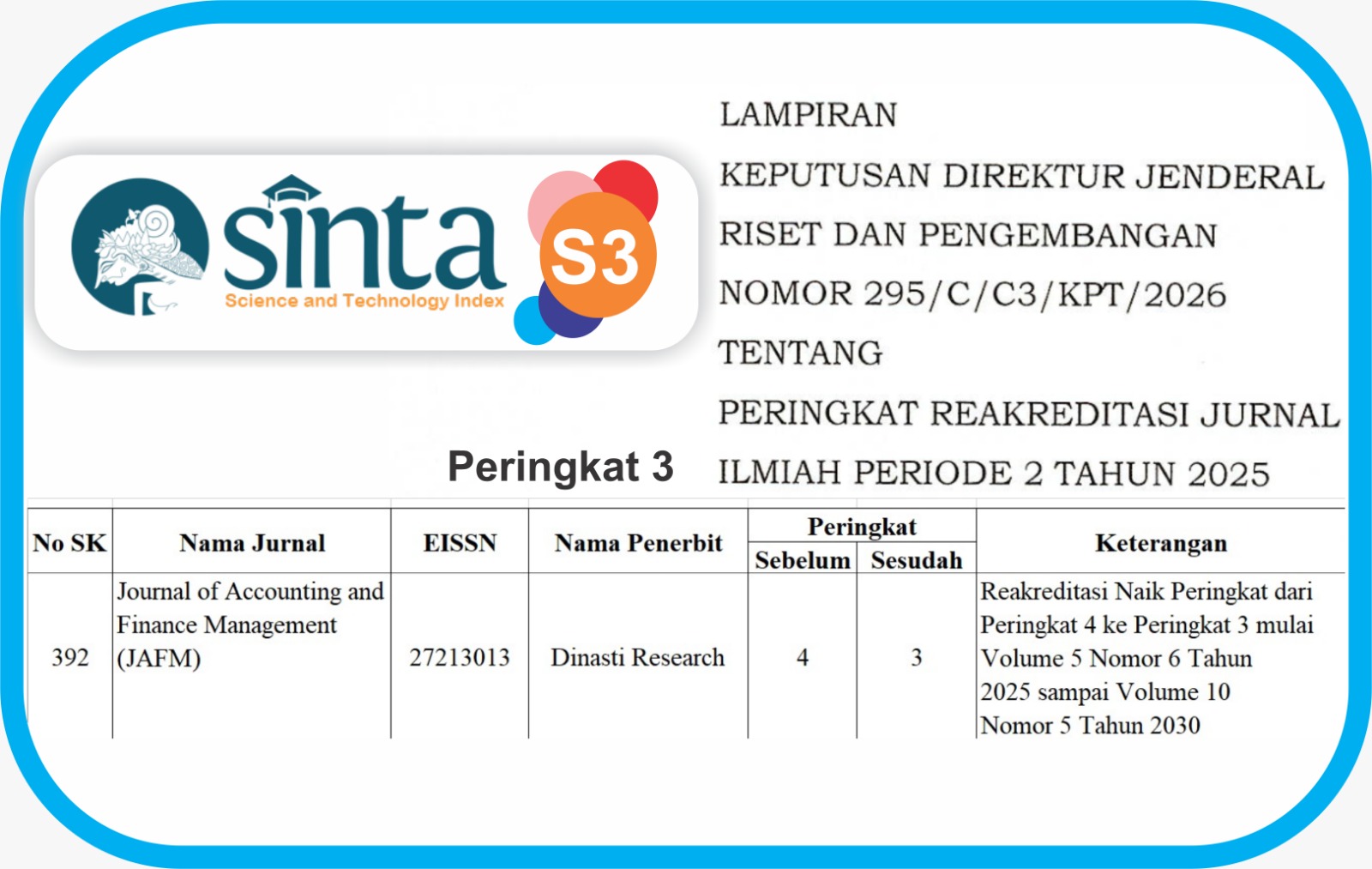The Effect of Governance Quality and Earning Management With Internal Control as Moderating Variable Towards Firm Value
DOI:
https://doi.org/10.38035/jafm.v1i4.23Keywords:
Corporate governance, earning management, internal control, firm valueAbstract
The purpose of this study is to analyze the influence of the quality of corporate governance, real earnings management on firm value and to analyze the influence of the quality of corporate governance with the internal control system as a moderating variable on firm value in companies included in the LQ 45 index 2016-2018. The data in this study used descriptive statistical analysis and inferential statistical analysis. The results showed that the Quality of Governance had no significant effect on Firm Value, Earnings Management had a significant effect on Firm Value and Internal Control could not moderate the effect of Governance Quality on Firm Value.
References
Cooper, Donald R., Boris Bloomberg & Pamela, 2008. Business Research Method . Second European Edition, USA. Mc Graw Hill International Edition.
Fama, EF, & Jensen, MC (1983). Agency Problems and Residual Claims. The Journal of Law and Economics , 26 (2), 327–349. https://doi.org/10.1086/467038
Gill, A., & Obradovich, J. (2012). The impact of corporate governance and financial leverage on the value of American firms. International Research Journal of Finance and Economics , 91 (February), 46–56.
Hastuti, TD, Ghozali, I., & Yuyetta, ENA (2017). The Effect Of Company Life Cycles On The Accruals Earning Management With Internal Control System As Moderating Variable. Polish Journal of Management Studies , 15 (1), 66–75. https://doi.org/10.17512/pjms.2017.15.1.07
Healy, PM, & Wahlen, JM (1999). A Review of the Earnings Management Literature and Its. Accounting Horizons , 13 (4), 365–383. https://doi.org/10.2308/acch.1999.13.4.365
Hunziker, S. (2013). Internal Control Disclosure and Agency Costs - Evidence from Switzerland listed non-financial companies. Stefan Hunzikera , 11 (January), 50.
Krismiaji, 2010. Accounting Information Systems . Yokyakarta: UPP AMP YKPN.
Kumar, N., & Singh, JP (2013). Effect of board size and promoter ownership on firm value: Some empirical findings from India. Corporate Governance (Bingley) , 13 (1), 88–98. https://doi.org/10.1108/14720701311302431
Mahdavi-Ardekani, A., Younesi, N., & Hashemijoo, M. (2012). Acquisition, Earnings Management and Firm's Performance: Evidence from Malaysia. Journal of Business Studies Quarterly , 4 (1), 91–110.
Mat Nor, F., & Sulong, Z. (2008). Dividends, ownership structure and board governance on firm value: empirical evidence from Malaysian listed firms. Malaysian Accounting Review , 7 (2).
Mulyadi. 2002. Accounting information system. Jakarta: Publisher Salemba Empat
BAPEPAM Regulation No KEP - 339 / BEJ / 07 - 2001
Prommin, P., Jumreornvong, S., & Jiraporn, P. (2014). The effect of corporate governance on stock liquidity: The case of Thailand. International Review of Economics and Finance , 32 , 132–142. https://doi.org/10.1016/j.iref.2014.01.011
Roychowdhury, S. (2006). Earnings management through real activities manipulation. Journal of Accounting and Economics , 42 (3), 335–370. https://doi.org/10.1016/j.jacceco.2006.01.002
Ruan, W., Tian, G., & Shiguang, M. (2011). Managerial Ownership, Capital Structure and Firm Value: Evidence from China's Civilian-run Firms. Australasian Accounting Business and Finance Journal , 5 (3), 73–92.
Sawicki, J. (2009). Corporate governance and dividend policy in Southeast Asia pre- and post-crisis. European Journal of Finance , 15 (2), 211–230. https://doi.org/10.1080/13518470802604440
Suryani, A., Pirzada, K., & Mufidah. (2018). Analysis of opportunistic behavior of management to company performance. Polish Journal of Management Studies , 18 (1), 379–388. https://doi.org/10.17512/pjms.2018.18.1.28
Scott, William, R. 2006. Financial Accounting Theory. Fifth Edition. Canada Prentice Hall
Downloads
Published
How to Cite
Issue
Section
License
Authors who publish their manuscripts in this journal agree to the following conditions:
- The copyright on each article belongs to the author(s).
- The author acknowledges that the Journal of Accounting and Finance Management (JAFM) has the right to be the first to publish with a Creative Commons Attribution 4.0 International license (Attribution 4.0 International (CC BY 4.0).
- Authors can submit articles separately, arrange for the non-exclusive distribution of manuscripts that have been published in this journal into other versions (e.g., sent to the author's institutional repository, publication into books, etc.), by acknowledging that the manuscript has been published for the first time in the Journal of Accounting and Finance Management (JAFM).




























